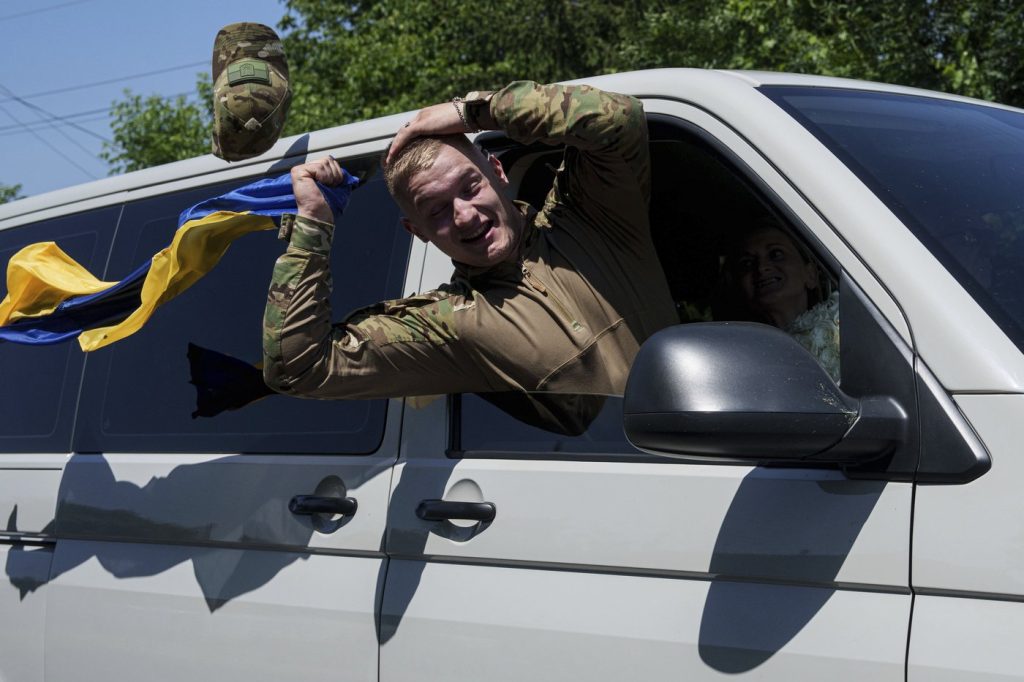Since his release from a Russian prison in April, Stanislav Tarnavskyi has been eagerly working to rebuild his life in Ukraine, accomplishing significant milestones in a short period. The 25-year-old has not only proposed to his girlfriend, but he has also purchased an apartment and adopted a golden retriever. His transformative week in July marked a reaffirmation of life and hope after three harrowing years of captivity, during which he experienced numerous traumas.
Captured during the battle for Mariupol in April 2022, Tarnavskyi has been struggling to cope with the psychological scars of war. Nightmares frequently plague him, bringing vivid reminders of the prisons he endured. “I see the officers who watched over us. I dream they want to harm me, catch me,” he shares, describing the fear and anxiety that grip him upon awakening in Kyiv, where he relocated after his hometown of Berdiansk was occupied by Russia.
With over 5,000 former prisoners of war (POWs) like Tarnavskyi in Ukraine, many are accessing rehabilitative services that include regular counseling. Experts emphasize the importance of psychological care as the implications of imprisonment and war continue to echo throughout their lives. Alongside any physical injuries, mental health must be prioritized, as the psychological toll of conflict can last generations.
In a photography studio high above Kyiv, sunlight streamed through the windows as Tarnavskyi proposed to his girlfriend, Tetiana Baieva. The bright atmosphere contrasted sharply with the darkness of his past. Holding a bouquet of pink roses and a ring, he expressed his gratitude for her unwavering support during his captivity. "You have always been my support, and I hope you will remain so for the rest of my life. Will you marry me?” he asked, a poignant reminder of his yearning for normalcy.
However, despite his newfound joy, Tarnavskyi struggles to articulate his experiences, fearing pity from those around him. His battle with paranoia arises from his time spent under constant surveillance in prison, where even the sight of a security camera triggers anxious flashbacks. Gradually, with the support of mental health professionals, he is making progress, finding solace in therapy.
Kseniia Voznitsyna, director of the Lisova Polyana mental health center for veterans, highlights that any ordinary stimulus can revive traumatic memories for ex-POWs. Contrary to common misconceptions, these individuals often isolate themselves, avoiding social situations. “They say time heals — five or 10 years, maybe — but it doesn’t. It just feels less intense,” she states, underscoring the need for continued monitoring and care.
Denys Zalizko, a 21-year-old former POW, emphasizes the long-term nature of recovery. Just months after his release, he acknowledges the ongoing challenges that accompany reintegration. After enduring 15 months of torture and relentless abuse, he is working to reclaim his life, yet the trauma is indelible. “You can’t fool yourself. Even if you really want to, you will never forget. It will always haunt you,” he reflects.
Zalizko's physical condition has improved significantly since his release, as he has regained strength and vitality. Yet, his eyes still carry the weight of sorrow. Music and exercise have become vital elements in his journey toward healing, helping to stave off anxiety. Both he and Tarnavskyi participate in mandatory counseling at the Lisova Polyana mental health center, yet both continue to navigate the remnants of hypervigilance that plague them.
The emotional strain on families of former POWs is also significant, as they, too, grapple with the newfound dynamics of reintegration. Maria Zalizko, Denys's mother, describes the shock of seeing her son after his release. While she has been advised to give him space, he often reaches out to her, showcasing the bond that music has forged between them, a skill she nurtured in him as a child.
Now focused on a career as an artist, Denys dreams of transforming the songs he composed in captivity into a new form of expression. "I love music. Music unites,” he states, revealing his resilience and desire for future growth. As he navigates the aftermath of war, he declares, “I’ve become stronger now. I’m not afraid of death, not afraid of losing an arm or a leg, not afraid of dying instantly. I fear nothing anymore.”












